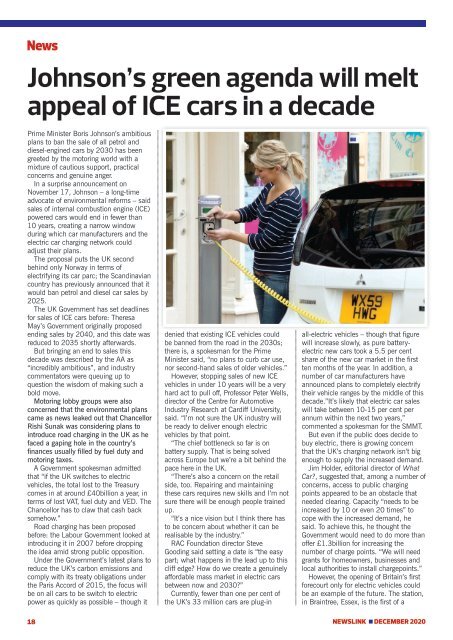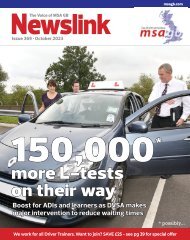Create successful ePaper yourself
Turn your PDF publications into a flip-book with our unique Google optimized e-Paper software.
News<br />
Johnson’s green agenda will melt<br />
appeal of ICE cars in a decade<br />
Prime Minister Boris Johnson’s ambitious<br />
plans to ban the sale of all petrol and<br />
diesel-engined cars by 2030 has been<br />
greeted by the motoring world with a<br />
mixture of cautious support, practical<br />
concerns and genuine anger.<br />
In a surprise announcement on<br />
November 17, Johnson – a long-time<br />
advocate of environmental reforms – said<br />
sales of internal combustion engine (ICE)<br />
powered cars would end in fewer than<br />
10 years, creating a narrow window<br />
during which car manufacturers and the<br />
electric car charging network could<br />
adjust their plans.<br />
The proposal puts the UK second<br />
behind only Norway in terms of<br />
electrifying its car parc; the Scandinavian<br />
country has previously announced that it<br />
would ban petrol and diesel car sales by<br />
2025.<br />
The UK Government has set deadlines<br />
for sales of ICE cars before: Theresa<br />
May’s Government originally proposed<br />
ending sales by 2040, and this date was<br />
reduced to 2035 shortly afterwards.<br />
But bringing an end to sales this<br />
decade was described by the AA as<br />
“incredibly ambitious”, and industry<br />
commentators were queuing up to<br />
question the wisdom of making such a<br />
bold move.<br />
Motoring lobby groups were also<br />
concerned that the environmental plans<br />
came as news leaked out that Chancellor<br />
Rishi Sunak was considering plans to<br />
introduce road charging in the UK as he<br />
faced a gaping hole in the country’s<br />
finances usually filled by fuel duty and<br />
motoring taxes.<br />
A Government spokesman admitted<br />
that “if the UK switches to electric<br />
vehicles, the total lost to the Treasury<br />
comes in at around £40billion a year, in<br />
terms of lost VAT, fuel duty and VED. The<br />
Chancellor has to claw that cash back<br />
somehow.”<br />
Road charging has been proposed<br />
before: the Labour Government looked at<br />
introducing it in 2007 before dropping<br />
the idea amid strong public opposition.<br />
Under the Government’s latest plans to<br />
reduce the UK’s carbon emissions and<br />
comply with its treaty obligations under<br />
the Paris Accord of 2015, the focus will<br />
be on all cars to be switch to electric<br />
power as quickly as possible – though it<br />
denied that existing ICE vehicles could<br />
be banned from the road in the 2030s;<br />
there is, a spokesman for the Prime<br />
Minister said, “no plans to curb car use,<br />
nor second-hand sales of older vehicles.”<br />
However, stopping sales of new ICE<br />
vehicles in under 10 years will be a very<br />
hard act to pull off, Professor Peter Wells,<br />
director of the Centre for Automotive<br />
Industry Research at Cardiff University,<br />
said. “I’m not sure the UK industry will<br />
be ready to deliver enough electric<br />
vehicles by that point.<br />
“The chief bottleneck so far is on<br />
battery supply. That is being solved<br />
across Europe but we’re a bit behind the<br />
pace here in the UK.<br />
“There’s also a concern on the retail<br />
side, too. Repairing and maintaining<br />
these cars requires new skills and I’m not<br />
sure there will be enough people trained<br />
up.<br />
“It’s a nice vision but I think there has<br />
to be concern about whether it can be<br />
realisable by the industry.”<br />
RAC Foundation director Steve<br />
Gooding said setting a date is “the easy<br />
part; what happens in the lead up to this<br />
cliff edge? How do we create a genuinely<br />
affordable mass market in electric cars<br />
between now and 2030?”<br />
Currently, fewer than one per cent of<br />
the UK’s 33 million cars are plug-in<br />
all-electric vehicles – though that figure<br />
will increase slowly, as pure batteryelectric<br />
new cars took a 5.5 per cent<br />
share of the new car market in the first<br />
ten months of the year. In addition, a<br />
number of car manufacturers have<br />
announced plans to completely electrify<br />
their vehicle ranges by the middle of this<br />
decade.”It’s likely that electric car sales<br />
will take between 10-15 per cent per<br />
annum within the next two years,”<br />
commented a spokesman for the SMMT.<br />
But even if the public does decide to<br />
buy electric, there is growing concern<br />
that the UK’s charging network isn’t big<br />
enough to supply the increased demand.<br />
Jim Holder, editorial director of What<br />
Car?, suggested that, among a number of<br />
concerns, access to public charging<br />
points appeared to be an obstacle that<br />
needed clearing. Capacity “needs to be<br />
increased by 10 or even 20 times” to<br />
cope with the increased demand, he<br />
said. To achieve this, he thought the<br />
Government would need to do more than<br />
offer £1.3billion for increasing the<br />
number of charge points. “We will need<br />
grants for homeowners, businesses and<br />
local authorities to install chargepoints.”<br />
However, the opening of Britain’s first<br />
forecourt only for electric vehicles could<br />
be an example of the future. The station,<br />
in Braintree, Essex, is the first of a<br />
18<br />
NEWSLINK n DECEMBER 2020

















